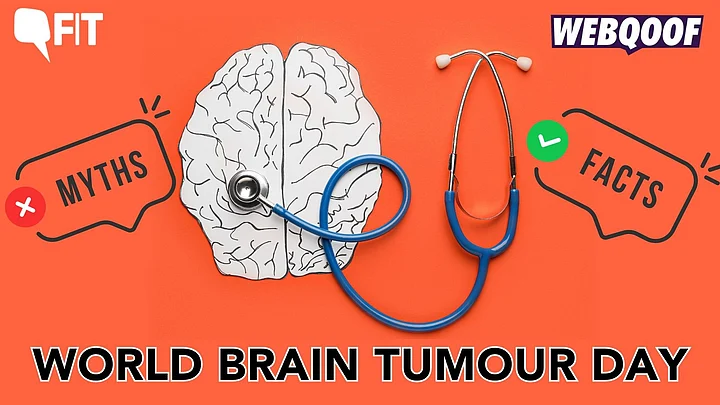In India, the prevalence of central nervous system (CNS) tumors ranges from 5 to 10 per 100,000 population with an increasing trend. Out of these, only 2 percent of the tumours turn cancerous.
A brain tumour is a growth of cells in the brain or abnormal mass of tissue that multiplies in an uncontrollable way. More than 150 different brain tumors have been documented till date.
Every year, 8 June is celebrated as world brain tumour day, this year we spoke to break some myths about the condition.
We reached out to Dr Jayesh Sardhara, Senior Consultant - Neuro and Spine Surgery, Fortis Hospital, Mumbai, Dr Abhijit G Warade, Consultant - Neuro Surgery, PD Hinduja Hospital, Mumbai and Dr Midhun Murali, Consultant Radiation Oncologist, American Oncology Institute, Kozhikode.
MYTH 1: ALL BRAIN TUMOURS ARE CANCEROUS
According to Cancer Research UK, brain tumours are graded based on how fast they grow.
Grade 1 and 2 tumours are low grade and benign whereas grade 3 and 4 tumours are high grade and can be cancerous.
Dr Jayesh Sardhara says that it's a myth that all tumours are cancerous.
"The majority of the tumours are benign. Most common tumour of the brain is meningioma which is not cancerous," he adds.
Dr Abhijit G Warade also adds that "not all tumours are deadly" and patients can "live a normal life after curing a benign brain tumour."
MYTH 2: EXCESSIVE USE OF MOBILE PHONES CAN CAUSE BRAIN TUMOURS
A study conducted by American Cancer Society states that using mobile phone for more than 13 years did not show any link with an increase in the risk of brain tumors.
Centers for Disease Control and Prevention (CDC) has also issued a statement stating that there is not enough scientific evidence to show that using phones can cause major health problems or brain tumours.
Sardhara says, "This is not at all true, it is an absolute myth. Mobile phone's radiation doesn't cause brain tumours."
According to World Health Organisation (WHO), we can't determine mobile phone's long-term affects on humans because the phones were not widely used until the early 1990s.
It adds that the results of animal studies consistently resulted in no increase in risk of cancer for long-term exposure to radiofrequency fields.
MYTH 3: BRAIN TUMOURS ARE NOT HEREDITARY
Brain tumours can be hereditary but only around 20 percent of these cases can be passed onto family, says Dr Midhun Murali.
Warade further points out that some sporadic tumours or idiopathic tumours, which have no reason of cause, cannot get transmitted with hereditary.
Cancer Research UK states that only a few types of brain tumours are related to known genetic conditions.
It lists down syndromes which might increase the risk of getting a brain tumour. These syndromes include neurofibromatosis (NF) type 1 and type 2, tuberous sclerosis (TSC), Li-Fraumeni syndrome, Von Hippel-Lindau syndrome (VHL), Turner syndrome, Turcot syndrome and Gorlin syndrome.
MYTH 4: ONCE TREATED, BRAIN TUMOURS CANNOT REOCCUR
"Brain tumours can recur even after it is treated," says Sardhara.
He adds that if the tumour is removed 100 percent then it won't reoccur but when some cells are still left in the body then the recurrence of the tumour is possible.
"It also depends on the grade of the tumour. After removal of grade 3 or 4 tumours, there is a high possibility for it to grow back as compared to grade 1 or 2 tumour," mentions Murali.
The benign tumour grows back slowly while the cancerous tumour grows faster.
National Cancer Institute states that it is possible for a brain or spine tumor to return in another location anywhere in the central nervous system (CNS).
MYTH 5: BRAIN TUMOURS CANNOT AFFECT CHILDREN
The second most common cancer noticed in children is the brain or Central Nervous System (CNS) cancer, which implies that brain tumours can occur in children too.
"This is a complete myth. Brain tumours are known to happen right from the womb of the mother, children with brain tumour have been diagnosed in an ultrasound scan on third trimester pregnancy, " says Warade.
Clearly, brain tumours can occur to anybody belonging to any age group.
(At The Quint, we question everything. Play an active role in shaping our journalism by becoming a member today.)
